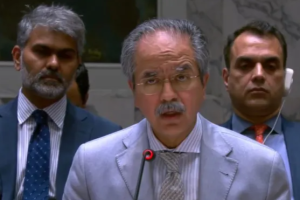Transport Minister Ong Ye Kung has warned that Singaporeans’ “us versus them” mentality towards foreigners could affect the city-state”s standing as a financial centre, English daily TODAY reported on Wednesday.
Singaporeans are not getting short-changed of senior roles at banks, and there are ongoing efforts to create opportunities for locals, he told Parliament on Tuesday.
Still, while there is no doubt that being a global financial hub has benefitted Singapore, Ong acknowledged that concerns over foreign manpower in the sector should be taken seriously.
The financial sector, which makes up 13 percent of Singapore’s economy, employs about 171,000 workers.
About 70 percent of the workforce are Singaporeans, 14 percent permanent residents and 16 percent work pass holders, according to the Monetary Authority of Singapore, the de facto central bank.
Singaporeans account for 44 percent of senior roles, permanent residents 20 percent and work pass holders 36 percent, with these proportions remaining stable in recent years, said Ong.
Non-Singaporeans in senior roles hail from over 50 countries, with the largest group from Europe and other “significant nationalities” from Asia and North America, he added.
While Ong acknowledged concerns that 44 percent of Singaporeans in senior positions could be “too low”, he attributed the figure to the international component of activities in the financial centre.
“Singapore has grown as a global financial centre as more financial institutions set up regional or global functions here. They have made us the hub for expertise, networking and oversight of operations in other markets,” he said.
Meanwhile, Manpower Minister Josephine Teo has cautioned that imposing quotas on higher-end foreign professionals on employment passes (EPs) is not unthinkable, but such a move would probably be unwise.
It is much better to use salary requirements to ensure companies can access foreign professionals of the right quality while committing to build up their local staff over time, Minister Teo also told Parliament.
The Ministry of Manpower (MOM), she said, intends to review the hiring practices of companies whose “Singaporean core has been weakening”, as well as those whose employment pass (EP) and S Pass workforce are “overly concentrated” from a single foreign nationality source, said Teo.
The move comes amid a heightened sense of insecurity about jobs in Singapore, in an economy battered by the COVID-19 pandemic.
Teo told the House that MOM will work with other agencies to actively intervene and help such companies reshape their workforce profiles.
The ministry will also engage the human resources community to “do more”, she added.
Teo was responding to several Members of Parliament (MPs), who had posed the issue of job competition between Singaporeans and work pass holders (foreigners).
She pointed out that work pass policies have been regularly adjusted, slowing down the growth of Employment Pass and S Pass holders.
Between 2014 and 2019, the number of Employment Pass and S Pass holders grew on average by fewer than 9,000 annually, compared with the average annual growth of 30,400 in between 2009 and 2014.
In comparison, the number of locals in professionals, managers, executives and technicians (PMETs) jobs rose by an average of about 35,000 annually between 2014 and 2019.
With COVID-19, the number of Employment Pass and S Pass holders have also come down sharply, she said, adding that this group of workers dropped by 22,000 between January and July this year.
Singapore”s overall unemployment rate has risen to its highest level in more than a decade, with retrenchments more than doubling because of the COVID-19 pandemic.
According to the latest labour market report MOM on Jun 15, 2020, the overall unemployment rate crept up from 2.3 per cent in the previous quarter to 2.4 percent.
The unemployment rate among Singapore citizens rose from 3.3 to 3.5 percent, and among residents – or Singapore citizens and permanent residents – from 3.2 per cent to 3.3 per cent.
In the second quarter, retrenchments more than doubled to 6,700, from 3,220 in the previous quarter.
Teo said that MOM actively monitors retrenchment exercises, and that the vast majority have so far been conducted fairly and responsibly.
“By and large, there has also not been a weakening of the Singaporean core,” the Channel News Asia quoted Teo as assuring.

























Add Comment